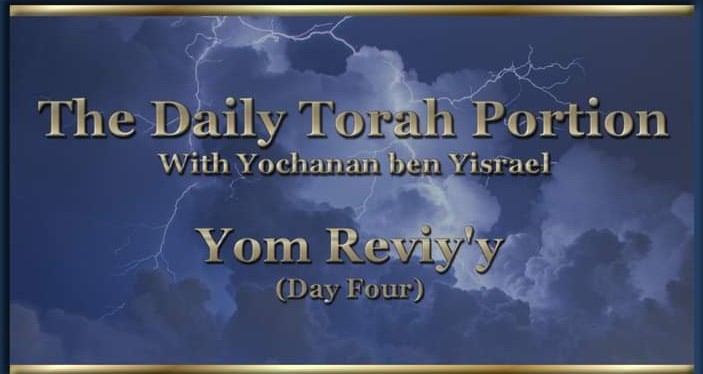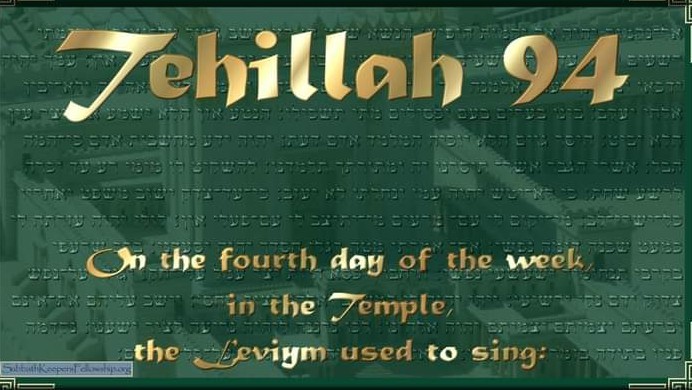Watch
Events
Articles
Market
More
Sabbath Keepers Fellowship & Prison Ministry
Min Hazaqen Torah Study Group on Facebook
Christi Banks
Yochanan Ben Yisrael
14 Va’eira – Day 4
Sh’moth 7:8-8:6
And YHWH spoke to Mosheh and to Aharon, saying, “When Pharaoh speaks to you, saying, ‘Show a miracle for yourselves,’ then you shall say to Aharon, ‘Take your rod and throw it before Pharaoh, and let it become a serpent.’”
So Mosheh and Aharon went in to Pharaoh, and they did so, as YHWH commanded. And Aharon threw his rod before Pharaoh and before his servants, and it became a serpent.
But Pharaoh also called the wise men and the practisers of witchcraft. And they, the magicians of Mitsrayim, also did so with their magic.
And they, each one, threw down his rod, and they became serpents. But the rod of Aharon swallowed up their rods.
And Pharaoh’s heart was strengthened, and he did not listen to them, as YHWH had said.
And YHWH said to Mosheh, “The heart of Pharaoh is hard, he refuses to let the people go.
“Go to Pharaoh in the morning, as he goes out to the water, and you shall stand by the river’s bank to meet him. And take in your hand the rod which was turned into a serpent.
“And you shall say to him, ‘YHWH the Elohim of the Hebrews has sent me to you, saying, “Let My people go, so that they serve Me in the wilderness,” but see, until now you have not listened!
‘Thus said YHWH, “By this you know that I am YHWH. See, I am striking the waters which are in the river with the rod that is in my hand, and they shall be turned to blood, and the fish in the river shall die. And the river shall stink, and the Mitsrites shall find it impossible to drink the water of the river.”’”
And YHWH spoke to Mosheh, “Say to Aharon, ‘Take your rod and stretch out your hand over the waters of Mitsrayim, over their streams, over their rivers, over their ponds, and over all their pools of water, that they become blood. And there shall be blood in all the land of Mitsrayim, both in wooden and in stone containers.’”
And Mosheh and Aharon did so, as YHWH commanded. And he lifted up the rod and struck the waters that were in the river, in the eyes of Pharaoh and in the eyes of his servants. And all the waters that were in the river were turned to blood.
And the fish that were in the river died, and the river stank, and the Mitsrites were unable to drink the water of the river. And the blood was in all the land of Mitsrayim.
And the magicians of Mitsrayim did the same with their magic. And the heart of Pharaoh was strengthened, and he did not listen to them, as YHWH had said.
And Pharaoh turned and went into his house, and his heart was not moved by this either.
And all the Mitsrites dug all around the river for water to drink, for they were unable to drink the water of the river.
And seven days were completed after YHWH had struck the river.
And YHWH spoke to Mosheh, “Go to Pharaoh and say to him, ‘Thus said YHWH, “Let My people go, so that they serve Me.
“But if you refuse to let them go, see, I am smiting all your border with frogs.
“And the river shall swarm with frogs, which shall go up and shall come into your house, and into your bedroom, and on your bed, and into the houses of your servants, and on your people, and into your ovens, and into your kneading bowls, and the frogs shall come up on you and on your people and on all your servants.”‘“
And YHWH said to Mosheh, “Say to Aharon, ‘Stretch out your hand with your rod over the streams, over the rivers, and over the ponds, and cause frogs to come up on the land of Mitsrayim.’”
So Aharon stretched out his hand over the waters of Mitsrayim, and the frogs came up, and covered the land of Mitsrayim. And the magicians did so with their magic, and brought up frogs on the land of Mitsrayim.




Sabbath Keepers Fellowship and Prison Ministries
Min Hazaqen Torah Study Group on Facebook
Christi Banks
Yochanan Ben Yisrael
Tehillah 94 - Day 4 (Yom Revi’y)
O YHWH, Ěl of vengeance; O Ěl of vengeance, shine forth!
Raise Yourself up, O Judge of the earth; Render punishment to the proud.
YHWH, how long are the wrong, How long are the wrong going to exult?
They pour forth words, They speak arrogantly; All the workers of wickedness boast in themselves.
They crush Your people, O YHWH, And they afflict Your inheritance.
They kill the widow and the stranger, And murder the fatherless.
Yet they say, “Yah does not see, And the Elohim of Ya‛aqoḇ pays no heed.”
Take heed, you senseless among the people; And you fools, when would you become wise?
He who planted the ear, does He not hear? He who formed the eye, does He not see?
He who disciplines the nations, Does He not reprove – The One teaching man knowledge?
YHWH knows the thoughts of man, That they are but a breath.
Blessed is the man You discipline, O Yah, And instruct out of Your Torah, To give him rest from the days of evil, Until the pit is dug for the wrong.
For YHWH does not leave His people, Nor does He forsake His inheritance.
For judgment returns man to righteousness, And all the upright in heart follow it.
Who would rise up for me against evil-doers? Who would stand up for me against workers of wickedness?
If YHWH had not been my help, My being would soon have settled in silence.
When I said, “My foot has slipped,” Your mercy, O YHWH, supported me.
When anxiety was great within me, Your comforts delighted my being.
Would a throne of destruction, Which devises trouble by law, Be joined with You?
They band together against the life of the righteous, And declare innocent blood wrong.
But YHWH is my defense, And my Elohim the rock of my refuge, And brings back on them their own wickedness, And cuts them off in their own wrongdoing; YHWH our Elohim does cut them off.
Come, let us sing to YHWH! Let us raise a shout to the Rock of our deliverance.
Let us come before His face with thanksgiving; Let us raise a shout to Him in song.
For YHWH is a great Ěl, And a great King above all mighty ones.




Shalom Torah Family
Please review & share with others
https://www.fiverr.com/s/ZQppoR



The fear of YHWH is the beginning of knowledge; fools despise wisdom and instruction.
Proverbs 1:7
The fear of YHWH is the acute, persistent awareness of God's overwhelming power, authority, and holiness. Until you are aware of God's glory and your own insignificance, any knowledge you might gain is meaningless and disconnected from reality.



In #exodus 6:3, God said Abraham, Isaac, and Jacob didn't know him by the name YHVH. It doesn't mean they didn't know the word "YHVH" but rather a manner of relating to Him. The Bible uses different names for God to emphasize different aspects of his character or the roles he plays in his creation. El Shaddai works thru the world. Elohim creates and judges the world. YHVH is hidden from/revealed to the world in relationship with his people. These are three modes in which the same God operates.
#biblestudy #torah #vaera


